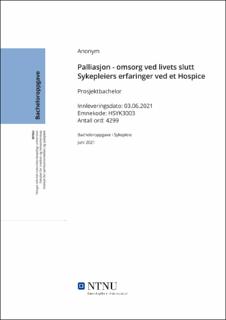| dc.contributor.advisor | Aune, Anne Grethe | |
| dc.contributor.author | Vollset, Ingrid | |
| dc.date.accessioned | 2021-09-25T16:24:36Z | |
| dc.date.available | 2021-09-25T16:24:36Z | |
| dc.date.issued | 2021 | |
| dc.identifier | no.ntnu:inspera:81643445:35713703 | |
| dc.identifier.uri | https://hdl.handle.net/11250/2782939 | |
| dc.description.abstract | Sammendrag
Innledning: Livskvaliteten til pasienten i den siste delen av livet er betinget av sykepleiers måte å yte omsorg, pleie og behandling på. Studien undersøker samtalens verdi hos den enkelte pasient, samt betydningen av sykepleiers respons og følsomhet ovenfor preferansene til pasientens opplevelse av hva det å leve et meningsfullt liv innebærer.
Metode: Det ble utført et dybdeintervju med fire sykepleiere på et Hospice for å undersøke hva sykepleiere vektlegger som essensielt i samtale med pasienten. Intervjuene ble gjennomført separert digitalt, grunnet nasjonale retningslinjer i forbindelse med Covid-19. Etter de fire intervjuene var fullført, ble funnene nøye transkribert.
Resultat: Funn som lydhørhet, ha evne til å «sense» rommet og å bidra til å skape håp om fine øyeblikk fremheves som sentrale og viktige kommunikasjonsferdigheter hos sykepleier. Funn som å bidra til håp om fine øyeblikk og å invitere hyppig til samtale vises også i studien. Verdien av personsentrert sykepleie i samtale med pasienten er høy, da pasienten må møtes der de er.
Konklusjon: Parallelt med medikamentell smertelindring, bør sykepleiere også inneha høy kunnskap om pasientenes behov for livskvalitet og følelse av mening – lindring av psykisk og åndelig smerte. Sykepleiernes åpenhet og invitasjon for samtale med pasienten uavhengig av tid på døgnet, samt evnen til å kartlegge pasientens ønsker og behov, er sentralt i hvordan sykepleiere kan bidra til å skape en meningsfull tid ved livets slutt på, og slik dermed også dekke pasientens behov for samtale. | |
| dc.description.abstract | Abstract
Introduction: The health and quality of life regarding patients in the last stage of life is affected by the nurses way of providing care and treatment for the patient. This project examines the value of the conversation concerning the patient as an individual, as well as the importance of a nurse's response and sensitivity to the patient's preferences of what living a meaningful life entails.
Method: An in-depth interview was conducted with four nurses at a Hospice to investigate what nurses emphasize as essential in a conversation with the patient. The interviews were conducted digitally, due to national guidelines in connection with Covid-19. After the four interviews were completed, the findings were carefully transcribed.
Results: The nurse's communicative skills such as responsiveness, listening abilites and ability to "sense" the room are essential, as well as the nurse's personal relationship to death. Contributing to the hope for valuable and happier moments, as well as inviting patients to conversations frequently was something that emerged as important findings in the study. The value of person-centered nursing in conversation with the patient is high, as the patient must be met where they are.
Conclusion: In parallel to medicinal pain management, nurses should also have a high knowledge surrounding the patients need for quality of life and sense of meaning. According to the study, the nurses openness to conversation regardless of the time of day and their ability to map the patients wishes and needs are ways nurses can contribute to a meaningful and dignified last stage of life. In addition to this, the studies also show that inviting patients to engage in difficult conversations surrounding the topic, as well as facilitating individual-centered communication, will also impact the patients terminal stage and thus meet the patient's need for conversation. | |
| dc.language | nob | |
| dc.publisher | NTNU | |
| dc.title | Palliasjon - omsorg ved livets slutt
Sykepleiers erfaringer ved et Hospice | |
| dc.type | Bachelor thesis | |
